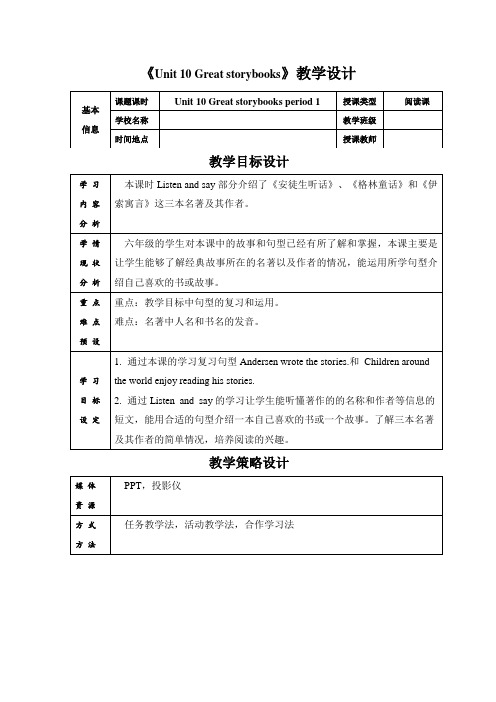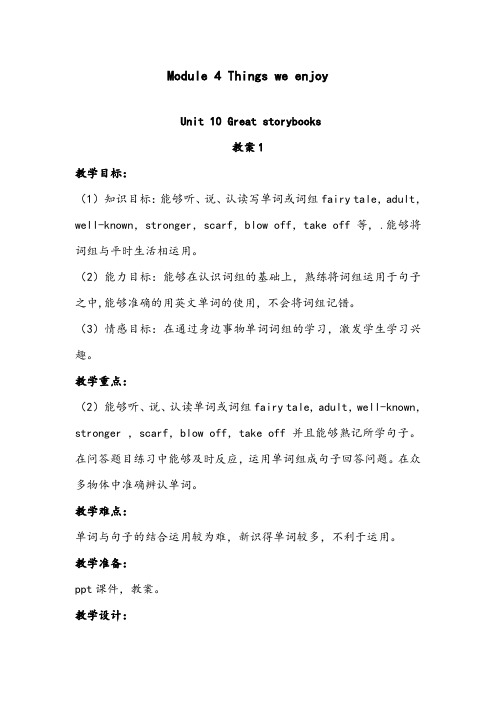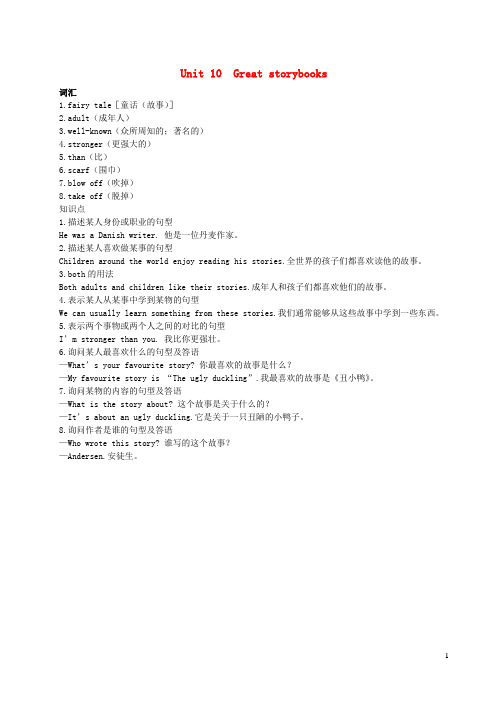最新沪教版小学英语六年级下册Module 4 Unit 10 Great storybooks 公开课教学设计2
小学英语牛津上海版六年级下册《Module 4 Unit 10 Great storybook》教案

《Unit 10 Great storybooks》教学设计教学目标设计教学策略设计学习评价设计【主要内容】1. Check students ‘homework: read the name of the books and match the stories with the books.【评价反馈】小组评价【主要内容】1. Read and answer. The teacher asks students to read paragraph 1 and 2, and then answer the questions.2. Read and retell. Ask students to find the key words in Para 3 and 4, and then retell the test with your own words.3. Do a survey. Ask students to do a survey about the classmate’s favorite story and make a report.【评价反馈】1.教师评价2.学生评价【主要内容】1. Find some Chinese classical books and share to our classmate.2. Make a reading card about your favorite Chinese stories.【评价反馈】1.组长评价2.教师评价教学过程设计【激趣导入】 1.The teacher shows some pictures about students reading books in ourschool.2. Ask the question “What is he thinking about?” “Do you like reading?”“What kind of books does you like reading?”【设计意图】1.通过图片引出本课主题。
牛津沪教版英语六年级下册Module 4 Unit 10 Great storybooks课件

Group work
“I,” said Mr Wind,
Characters(角色):
1. Mr Wind 2. Mr Sun 3. Narrator(旁白)
“Am stronger than you.” “You’re not,” said Mr Sun.
“I’m stronger than you.”
“I’m cold,” said the man, “I’ll put on my scarf.”
“I told you,” said Mr Sun. And he began to laugh.
Characters(角色):1. Mr Wind 2. Mr Sun 3. The man 4.Narrator(旁白)...
10
Module 4 Things we enjoy
Period 2
Let’s sing together
Talk about weather
What kind of weather do you like?
I like rainy days. I can walk in rainy days.
PK
Listen and fill in the blanks
“That man,” said Mr Wind, “I’ll __bl_o_w_ _o_ff__his clothes.” “Let’s __s_e_e_,” said Mr Sun. And behind a cloud he went.
scarf
scarfs /fs/
scarves /vz/
Look and choose
Which is laugh?
A
B
laugh
六年级英语下册课件-Module 4 Unit 10 Great storybooks牛津上海版

Mid-autumn Festival
Double ninth Day
Date
On April 4th or 5th
On the 15th day of the 8th lunar month
On the 5th day of the 5th lunar month
Module 4 Things we enjoy
1
Canada
Greenland The UK
The USA
Russia China
Australia
Guess and say
Are they Chinese or Western festivals?
Spring Festival
Lantern Festival
Let's write
I'm interested in _________________________. I know it is _____________________ People __________________________________________ at this festival. It's so fun. I really want to see it!
1. Make a poster to introduce Chinese festivals.
2. Look up the information about other Western
festivals
Next class we'll share What you get.
Holiday
Date
In January or February
小学六年级英语下册(牛津上海版深圳用)Module 4 Unit 10 Great storybooks Period 3课件

Think and say What do you know abouts
?
?
Think and say Who wrote these great stories?
The emperor’s
new clothes
Andersen
Snow White
The Grimm brothers
Read aloud
Do you like skiing? Yes, I do. Do you like swimming? No, I don’t. What fruit do you like? I like papayas. When’s Teachers’ Day? It’s on 10th September.
Story: Writer: The story is about ...
Story: Snow White
Writer: The Grimm brothers
The story is about a beautiful princess. It tells us to be kind to others and love can be very powerful.
Read aloud
1 Are those books yours? Yes, they are.
2 Did your mum do the housework yesterday? No, she didn’t.
3 Where does he live? He lives on Zhongshan Road.
Step 2: Write (in simple words)
Step 3: Share
…’s favourite story is “…” It’s about … … wrote the story.
上海教育版英语六年级下册Module 4 Unit 10《Great storybooks》(第1课

What is the story about? It’s about….
Who wrote the story? …
Summary 本课重点句型: What’s your favourite story? My favourite story is “The ugly duckling”. What is the story about? Who wrote the story? 学会询问及回答喜欢的童话故事,并对故 事进行简单介绍。
Presentation What do you learn from this story?
Presentation
What’s your favorite story?
My favorite story is “The ugly duckling”
Presentation
What is the story about?
The farmer and the snake
Presentation Aesop
Presentation The wind and the sun
Presentation Which book is the story from?
Presentation
Who is stronger? Mr Wind or Mr Sun?
It’s about an ugly duckling. He becomes a beautiful swan.
Presentation
Who wrote this story?
Andersen
Practice in pairs
Talk about which story do you like to your partner with these sentence.
【优质】小学英语沪教版六年级下册Module 4 Unit 10 Great storybooks 优质公开课教案1

Module 4 Things we enjoyUnit 10 Great storybooks教案1教学目标:(1)知识目标:能够听、说、认读写单词或词组fairy tale,adult,well-known,stronger,scarf,blow off,take off等, .能够将词组与平时生活相运用。
(2)能力目标:能够在认识词组的基础上,熟练将词组运用于句子之中,能够准确的用英文单词的使用,不会将词组记错。
(3)情感目标:在通过身边事物单词词组的学习,激发学生学习兴趣。
教学重点:(2)能够听、说、认读单词或词组fairy tale, adult,well-known,stronger ,scarf,blow off,take off并且能够熟记所学句子。
在问答题目练习中能够及时反应,运用单词组成句子回答问题。
在众多物体中准确辨认单词。
教学难点:单词与句子的结合运用较为难,新识得单词较多,不利于运用。
教学准备:ppt课件,教案。
教学设计:Step1. PreparationLead-in.T:同学们,你们觉得今天我们会学什么?S1:….(老师开场提问学生问题)(设计意图:通过提出问题让学生独立思考发现问题答案。
培养学生的想象力,提高学生的注意力。
)Step2. PresentationLet’s get to learn some new phrases.教师展示新学词组的图片(fairy tale,adult,well-known,stronger,scarf,blow off,take off),同时配上单词及意思,让同学跟随老师大声学读单词,同时将图片与相对应单词相熟悉对应。
在将单词与句型相结合起来,不断操练单词的熟悉度。
(设计意图:通过简单直接的图片展示能够让同学们更好的了解事物,了解单词的意思,此时学生在脑中有一个直观的映像,对各种活动词组有一个更加直接明了理解,能够让同学们能够在理解的基础上记忆,重复朗读单词可以练习学生的发音,避免哑巴英语教学。
六年级英语下册Module4Unit10Greatstorybooks重点知识梳理牛津沪教版

Unit 10 Great storybooks词汇1.fairy tale[童话(故事)]2.adult(成年人)3.well-known(众所周知的;著名的)4.stronger(更强大的)5.than(比)6.scarf(围巾)7.blow off(吹掉)8.take off(脱掉)知识点1.描述某人身份或职业的句型He was a Danish writer. 他是一位丹麦作家。
2.描述某人喜欢做某事的句型Children around the world enjoy reading his stories.全世界的孩子们都喜欢读他的故事。
3.both的用法Both adults and children like their stories.成年人和孩子们都喜欢他们的故事。
4.表示某人从某事中学到某物的句型We can usually learn something from these stories.我们通常能够从这些故事中学到一些东西。
5.表示两个事物或两个人之间的对比的句型I’m stronger than you. 我比你更强壮。
6.询问某人最喜欢什么的句型及答语—What’s your favourite story? 你最喜欢的故事是什么?—My favourite story is “The ugly duckling”.我最喜欢的故事是《丑小鸭》。
7.询问某物的内容的句型及答语—What is the story about? 这个故事是关于什么的?—It’s about an ugly duckling.它是关于一只丑陋的小鸭子。
8.询问作者是谁的句型及答语—Who wrote this story? 谁写的这个故事?—Andersen.安徒生。
1。
六年级下册英语课件-Module 4 Unit 10 Great storybooks(1)| 牛津上海版 (共23张PPT)

Hans Christian Andersen
Do you remember the stories “The emperor’s new clothes” and “The ugly duckling”?
Andersen wrote the stories. He was a Danish writer. He wrote a lot of interesting fairy tales and stories. Children around the world enjoy reading his stories.
2 Recite “Listen and say” on Student’s Book page 62.
3 Finish Workbook pages 56 and 58.
The Grimm brothers were German writers. They collected a lot of stories. Both adults and children like their stories.
The Grimm brothers
More about the Grimm brothers
Think and say
Do you know these stories?
The first printed version of Aesop's Fables in English was published on 26th March, 1484, by William Caxton.
The lion and the mouse
Jacob was born in 1785 and Wilhelm was born in 1786.
- 1、下载文档前请自行甄别文档内容的完整性,平台不提供额外的编辑、内容补充、找答案等附加服务。
- 2、"仅部分预览"的文档,不可在线预览部分如存在完整性等问题,可反馈申请退款(可完整预览的文档不适用该条件!)。
- 3、如文档侵犯您的权益,请联系客服反馈,我们会尽快为您处理(人工客服工作时间:9:00-18:30)。
Module 4 Things we enjoy
Unit 10 Great storybooks
教案2
教学目标:
(1)知识目标:能够熟练运用Do you remember the story…? He╱She wrote a lot of interesting fairy tales and stories. Children around the world enjoy reading his stories等句子,并且能够听、说、认读写collect ,emperor, remember.
(2)能力目标:能够熟练的运用所学句子,能够掌握询问你还记得什么故事与回答,同时在学句子中学会新单词,学会新的句子运用。
(3)情感目标:理解小故事中包含大道理。
教学重点:
听懂、会说:Do you remember the story…? He╱She wrote a lot of interesting fairy tales and stories. Children around the world enjoy reading his stories等句子,能够听、说、认读写词组collect ,emperor, remember.在问答题目练习中能够及时反应,补充未完成的句子。
将问题清晰回答。
教学难点:
新句子较为难以记忆,句子容易弄混,学生记忆困难。
学生恐难以记住。
教学准备:
ppt课件,教案。
教学设计:
Lead-in.
T:同学们有听过什么故事吗?S1….(老师开场提问学生问题,问题贴近学生对学生进行提问。
)
(设计意图:利用同学们所熟悉的东西吸引同学们的注意力,同时引起同学们回
答问题的兴趣,为接下来句子的学习增强趣味性。
)
Step1. Presentation
Le t’s learn some new phrases
简单的用图文并展的方式首先将新单词引入,教同学识读单词collect ,emperor, remember
(设计意图:直接的语音教学让学生牢记单词发音,为接下来句子的运用打下基础。
)
Let’s learn some new sentences.
将所学句子展示出来(Do you remember the story…?He╱She wrote a lot of interesting fairy tales and stories. Children around the world enjoy reading his stories等),利用图文并茂的方式,让同学们有兴趣,在让老师读一遍,说出中文。
所学句子都用此种方式教给学生,所有句子教过过后,在从头开始教学生自己反复练习跟随老师熟读句子。
(设计意图:直接的句子学习虽较为枯燥,但句子较为长,强化训练有助于帮助学生更加快速的了解句子并且理解句子意思,同时可以训练句子发音。
)
Step2. Communicate
给同学几分钟的时间让同学们自己与自己的同桌练习对话交流。
用上今天所学句子。
(设计意图:单一的重复容易引起枯燥,让同学们自由发挥能够使得同学能够活学活用,不断的增强学习的能力。
)
Step3. Practice
1.培养学生辨认句子的能力
①游戏的具体操作:我们常常都有陷阱的这个游戏,无论在句子,单词,音标上都有,为什么?其实在我们的生活上也有,就好象现在的脑筋急转弯一样,
通过一个或者几个时间把你往一个思维定势上走,可是当突然告诉你结果的时候,你的感情是最强烈的,这个时候你的记忆也是最深刻的,我们的陷阱游戏就带有这个方面的特点。
②我们最开始也是带读,带读,带读,这个准备和上一个游戏的起飞阶段是一样的,但是起作用却是不一样的。
带读一个重要的作用是让学生产生一个惯性,这个惯性有好也有坏。
当我们完成了这个环节,学生读的越来越快,突然教师用手指着一个句子,可是读的是另一个句子,这个时候,学生的第一反应就是跟着读,那么就错了,这是老师的一个坏坏的笑就显得非常的重要了,增加了趣味性,同时也让学生明白他们错了。
这个时候教师就可以提出这个游戏的要求了:
③T :如果教师指的说的是一样的,那么同学们就和老师一起说,如果老师说的和指的不一样,那么学生就不要说,看哪个组的同学最聪明!
④这样就达到了游戏的目的,学生时刻在害怕说错,同时当错了之后,教师坏坏的笑容,真诚的指正,学生就能非常容易的记住这个句子了,我们的目的就达到了。
⑤注意事项:(1)教师本身对于内容要非常的熟练。
⑥通过奖励机制来完成的游戏,教师一定要有奖励的敏感性,同时教师一定要公正,公平。
2. 学生看图片或根据对话将所空缺的句子或单词补全。
要运用之前所学知识。
(设计意图:学生通过游戏,最大化的利用句型,同时最大化的将同学所学的单词等知识融会在句型之中。
将学习与游戏相结合,极大的激发了同学们的学习兴趣。
)
Step4. Homework
Make a conversation with your friends after class and write down on your notebook.。
